
As a course creator, choosing the right platform to host your courses can greatly impact your success. The perfect online course platform should offer tools for marketing and sales, help build strong connections with your audience, and keep them updated on new courses, special offers, and other events. Plus, it should let you easily create your courses.
Finding a platform that meets all these needs can be challenging. Kajabi and Passion.io are two platforms that offer different solutions. But how do you decide which one suits your business best?
To help you choose, we spent three weeks testing both platforms to discover their unique features. Here’s what we learned:
Kajabi‘s all-in-one digital business platform offers tools for entrepreneurs to create, market, and sell educational content. Depending on their preferences, students can use a desktop or a mobile app to access online courses, podcasts, webinars, coaching, and more.
On the other hand, Passion.io targets fitness coaches and content creators to offer courses and coaching programs on customized mobile applications. Creators can build their own apps and market them on Passion.io’s mobile app marketplace.
In this article, we look at Kajabi and Passion.io in eight different areas to provide you with a clear and easy-to-understand comparison:
- Plans and Pricing
- Creating and delivering courses
- Mobile application
- Marketing and Branding
- Sales funnels & landing pages
- Monetization
- Student Engagement
- Analytics
So, let’s dive into our honest comparison and see how Kajabi vs. Passion.io stack up against each other.
What is Kajabi?

Kajabi is an all-in-one online platform. It’s perfect for course creators, coaches, and entrepreneurs. With Kajabi, you can build, market, and sell digital products easily. These products include courses, memberships, and coaching programs. The platform offers all the essential tools you need. You can create and manage your content without relying on multiple third-party applications.
Kajabi’s platform offers a range of tools to simplify running an online business.
- Course Creation: Use Kajabi’s intuitive course builder to upload videos, create modules, and design lessons effortlessly.
- Marketing and Sales: Promote your products with built-in marketing tools. These include email campaigns, sales funnels, and landing pages.
- Website and Funnel Builder: Create custom websites and funnels without needing any coding skills. The platform features an easy-to-use drag-and-drop interface.
- Community Engagement: Build and nurture a community. You can use customizable membership sites and discussion forums for this purpose.
- Analytics: Track your progress with Kajabi’s comprehensive analytics tools. Measure the performance of your courses, sales, and marketing campaigns easily.
- Automation: Streamline tasks such as email follow-ups, offer reminders, and customer interactions. Kajabi’s powerful automation features handle these tasks for you.
Kajabi is a platform that takes care of every part of your online business. It’s perfect for creators who want everything in one place. With Kajabi, there’s no need to manage multiple platforms. It provides a comprehensive solution without any hassle.
But does Kajabi provide everything you need to stand out in the competitive online course space? That depends on your goals and business model.
Now that you have an understanding of what Kajabi offers, you might be interested in seeing how others are using it effectively. Explore some real-life Kajabi Course Examples to get inspiration for your own courses.
What is Passion.io?
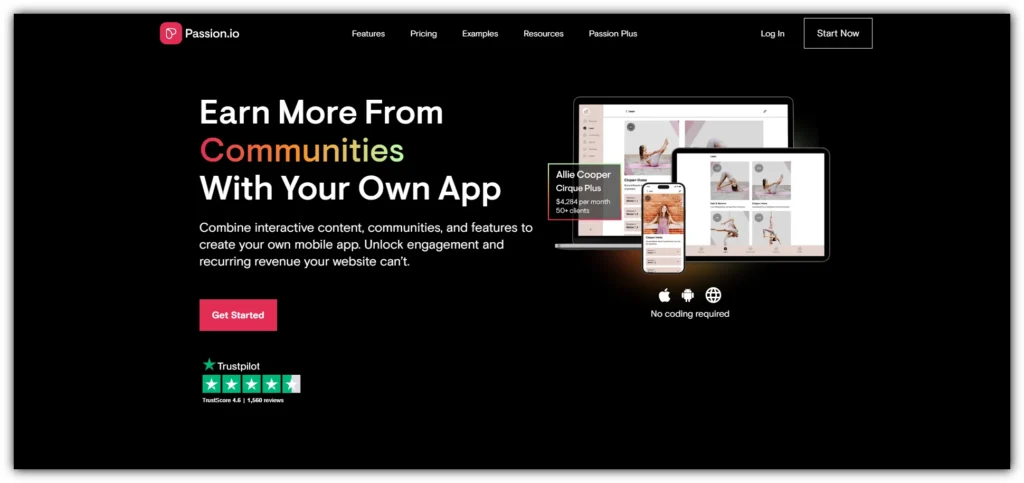
Passion.io is a platform for creating apps that lets you make your own mobile app for online courses instead of using a website. This is great for creators who want to build a personalized app to share and sell their content without needing coding skills or hiring a developer.
The app builder on Passion.io works like a simple drag-and-drop website builder, but it’s for apps. It allows course creators to design and brand their own course app. Here are some features it includes:
Key Features:
- Video Hosting: Upload and display videos.
- Course Modules and Lessons: Organize and structure your course content.
- Interactive Questionnaires and Quizzes: Engage users with questions and tests.
- Built-In Payment Processor: Accept subscriptions or one-time payments directly in the app.
You can also use it to set up a membership site, build a community, and live stream to your followers.
Passion.io states that by having your courses on an app, you can attract audiences who prefer using apps. But is simply having your own app enough to stand out and succeed in a competitive market?
Kajabi vs Passion.io: Course Creation & Delivery
Kajabi offers a simple and user-friendly web-based platform for course creation, while Passion.io allows you to create courses both on a mobile app and through a web platform. This makes both platforms flexible, but they cater to different preferences in how you want to design and deliver your content.
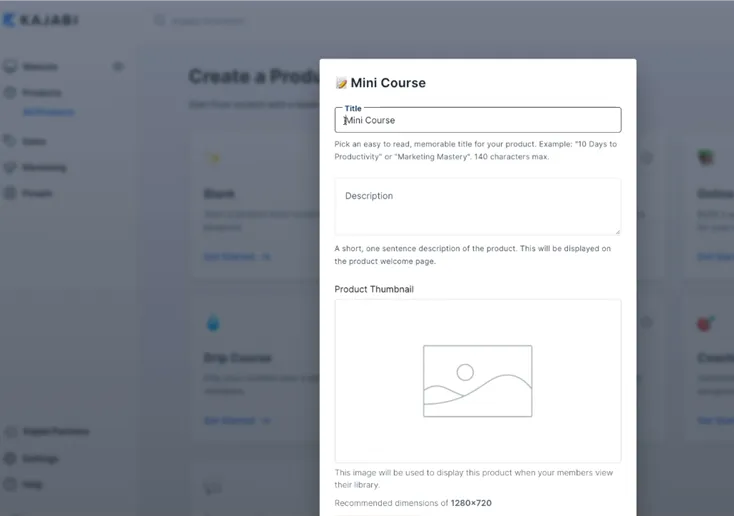
With Kajabi, you can quickly create course outlines using the AI Creator Hub, making the process smooth and efficient. Course creation in Kajabi is straightforward, allowing users to publish full-length online courses and coaching programs in just a few clicks. For those new to course creation, the AI feature is particularly helpful in generating shorter courses that can be tested before committing to building more extensive programs.
Kajabi courses can include interactive elements such as videos, quizzes, and workbooks. Thanks to its intuitive design, it doesn’t take much time to create a comprehensive course. You have the option to build courses with:
- AI-assisted or manual course outlines,
- Full customization of each course page and offer,
- Dedicated course-specific pages, offers, certificates, and management tools for customers.
Passion.io, on the other hand, stands out for its drag-and-drop course builder and pre-made templates that are designed for mobile use. Unlike Kajabi, Passion.io allows you to design courses entirely on a mobile app.

The drag-and-drop functionality, along with the provided templates, simplifies course creation on mobile devices. These templates come with suggested content that can be easily edited, and the widget library offers tools like videos, images, and timers for building engaging lessons.
When it comes to content delivery, Kajabi gives you content drip features across all its plans. This means you can release content gradually, allowing students to follow the course at a controlled pace. This feature helps in structuring the learning process more effectively by breaking down content into smaller, manageable sections.
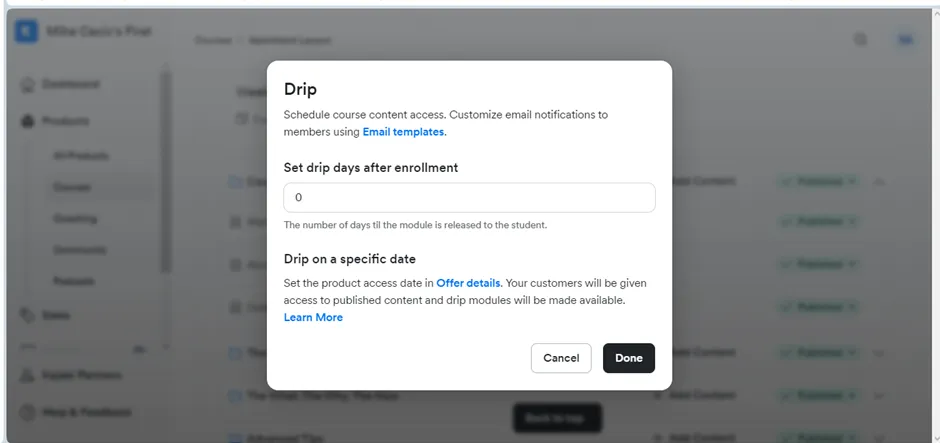
Passion.io also offers a content drip feature, but it is limited to the Ultimate plan or higher.
A major advantage of Passion.io is that it lets you deliver interactive courses with multimedia features. Students can download course materials, such as worksheets, quizzes, and videos, and access them offline. Additionally, Passion.io supports goal tracking for creators, allowing you to monitor student progress. This feature lets you see where each client is in their learning journey and offer advice through the app. You can even set up interactive exercises with timers to ensure clients meet their goals within a specific time frame.
Winner: Kajabi
Kajabi’s AI Creator Hub and ready-to-use templates make online course creation fast and easy. It also supports various content types like podcasts, videos, and live webinars, which are accessible on both desktop and mobile. Plus, the availability of mini-courses is a great option for creators who are just starting or in need of a quick solution.
Kajabi vs Passion.io: Marketing and Branding
When it comes to marketing and branding, Kajabi offers both automation and customization tools, while Passion.io focuses mainly on marketing automation.
Kajabi uses advanced tools to help you market your courses, coaching programs, and podcasts more efficiently. With Kajabi, you get a variety of features to promote your content:
- Email campaigns allow you to notify your students about new courses or coaching programs based on their previous purchases. This makes it easy to target the right audience.
- Funnels help guide customers smoothly through the buying process, boosting your sales and conversions.
- The AI Creator Hub can generate social media posts, sales scripts, email copy, and landing page content, all tailored to your marketing needs.
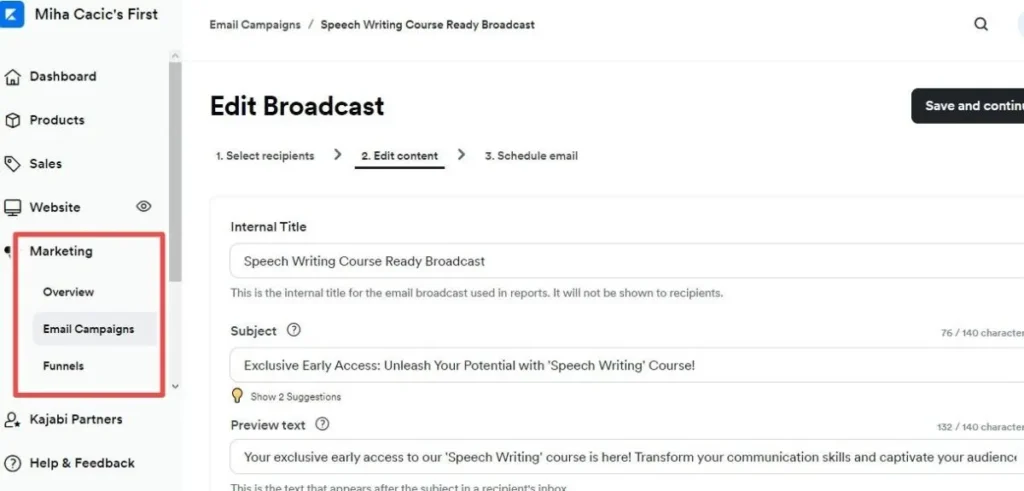
On the other hand, Passion.io doesn’t have built-in marketing tools, but it integrates with third-party services like Zapier. This lets you market your mobile app across different channels, including social media. With Zapier, you can automate tasks like sending promotional emails, setting up sales funnels, and offering discounts to your audience.
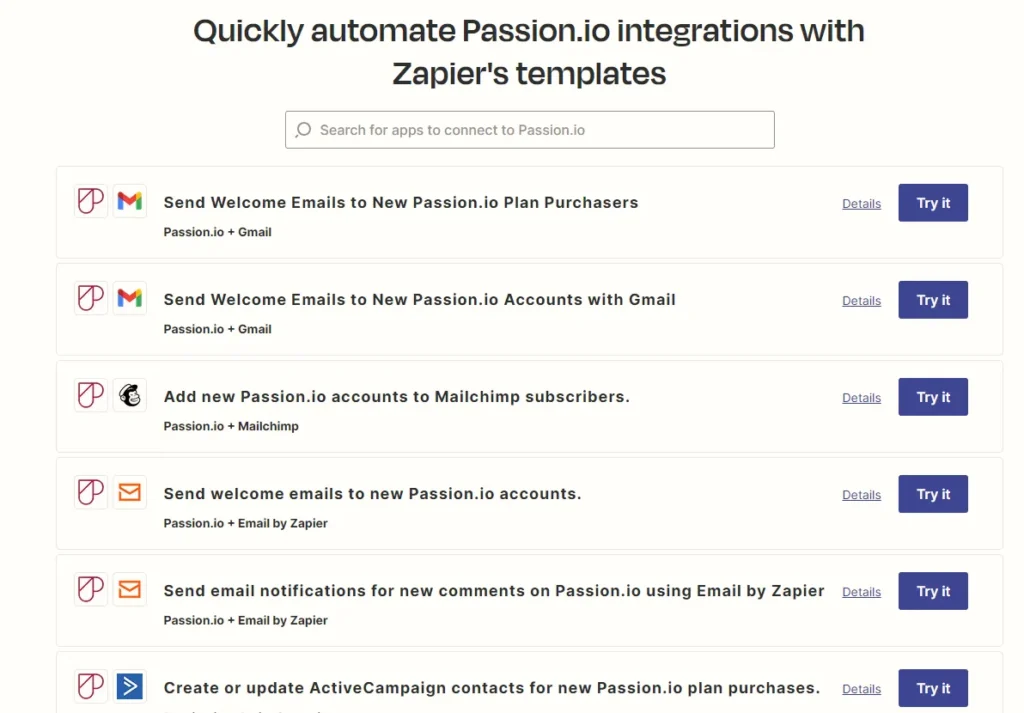
When it comes to branding, Kajabi allows you to fully customize your platform by adding your logo, brand colors, and instructor information. You can even save these as default settings so that each new piece of content or product automatically includes your brand elements. For example, you can have your logo, color scheme, and instructor details appear on every landing page, social media post, and email, saving you time and ensuring brand consistency.
On the other hand, Passion.io offers more basic branding options compared to Kajabi. You can choose from pre-designed theme templates to personalize your app, and you can also add your logo and images to keep your branding consistent. Although these options are simpler, they still give you some control over how your app looks. You can customize:
- Buttons for paid products,
- Text colors within lessons,
- Icons for community and tracking,
- Backgrounds on the discovery page, and more.
While both platforms allow you to adjust branding, Kajabi’s global brand settings make it easier to ensure every piece of content you create stays on brand. Passion.io’s customization options are decent but offer less flexibility compared to Kajabi.
Winner: Kajabi
Kajabi not only offers strong marketing automation but also provides comprehensive branding tools. Its customizable landing pages, pricing options, and universal brand settings make it a more powerful option for building and maintaining a consistent brand image across all content and platforms.
Kajabi vs Passion.io: Sales Funnels & Landing Pages
Both Kajabi and Passion.io provide tools for creating sales funnels, but their approaches differ significantly.
With Passion.io, you can add upsell options to the products you offer within the app. This allows you to guide customers through an upsell journey—starting with a free lead magnet, moving on to a lower-priced product, and eventually offering them your more expensive services. However, the sales funnel process largely happens within the app, meaning potential customers need to download and engage with your app before they can see your sales pages or offers.
In contrast, Kajabi takes a more integrated approach. Kajabi’s sales funnel builder includes both landing pages and upsell offers. One of Kajabi’s standout features is its robust landing page builder, which is easy to use and highly customizable. It offers a drag-and-drop interface with beautiful, responsive templates, so you can design landing pages that match your brand and effectively showcase your offers. With Kajabi, you can create an unlimited number of landing pages, upsells, and downsells, helping you convert visitors into paying customers.
Another advantage of Kajabi is that it allows you to follow up with automated email campaigns to keep engaging your prospects, all from within the platform. This makes it easy to reinforce the value of your offers and guide customers smoothly through your funnel.
While Passion.io does allow for the creation of sales pages, they are housed within the app itself. This means you need to direct potential customers to download and open the app before they can see your offers. For many creators, this adds an extra step that can hinder customer acquisition. As a result, you may need to invest in third-party tools for building landing pages outside the app, which could increase your overall costs and make it harder for prospects to find you organically.
Both platforms offer sales funnels, but Kajabi provides a more flexible and cost-effective solution by including landing pages and sales funnels all in one place.
Winner: Kajabi
Kajabi stands out with its easy-to-use landing page builder, unlimited sales funnel options, and integrated email follow-ups. This all-in-one approach makes it easier to promote, sell, and manage your products without relying on additional tools.
Kajabi vs Passion.io: Monetization
When it comes to making money from your courses, Kajabi and Passion.io offer different options, with Kajabi providing more flexibility in how you can increase revenue.
Kajabi offers multiple ways to monetize your content. You can sell digital products through affiliate programs, membership sites, and upsells. Whether you want to sell a single course, offer a subscription, or bundle multiple courses together, Kajabi supports all these options. This variety helps you cater to different customer preferences and maximize your earnings. You can use features like:
- Affiliate programs, where others can promote your courses and earn a commission.
- Memberships, allowing customers to pay regularly for ongoing content.
- Bundles, combining multiple products into one offer.
- Upsells, where you offer additional products after an initial purchase.
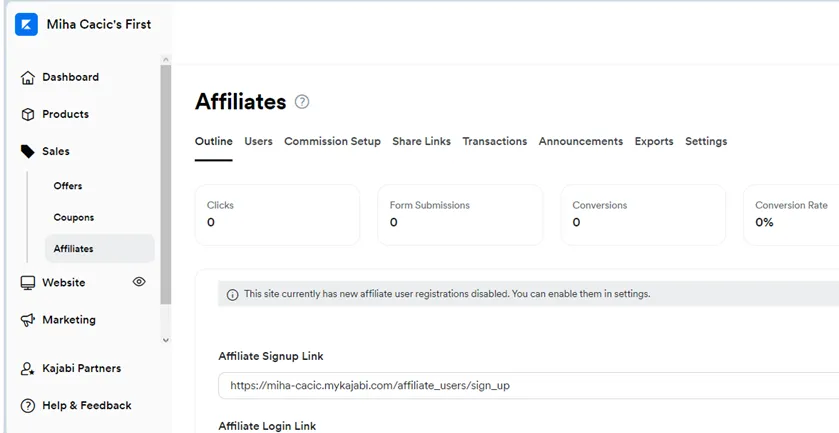
On the other hand, Passion.io allows you to monetize primarily through subscriptions and one-time purchases. The platform works well for creators who want to offer freemium content (free content with the option to upgrade) to attract users. Once they’ve experienced the value of your free content, you can offer them paid subscriptions. These subscriptions can be weekly, monthly, or yearly, depending on what suits your business. You can also combine subscriptions with high-ticket one-time purchases to boost your income.
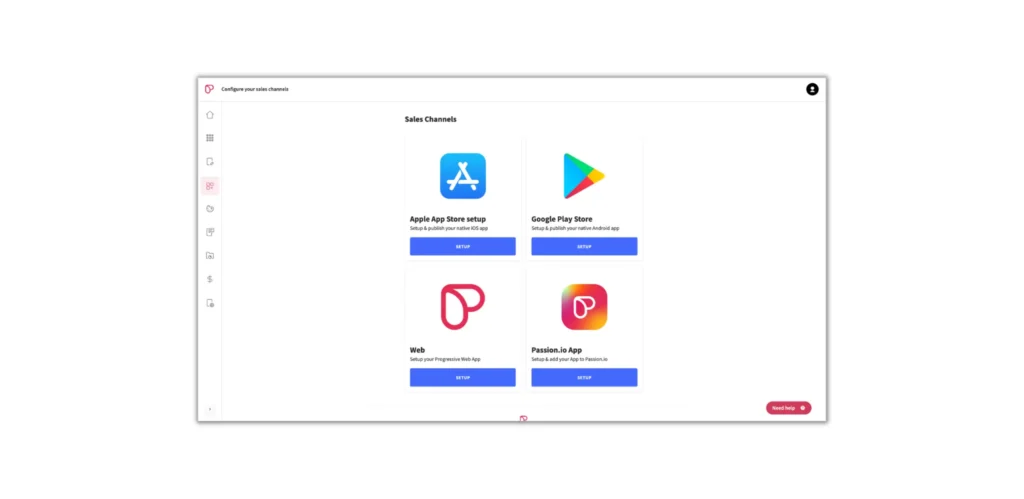
Passion.io also lets you offer in-app purchases, but there are some limitations. To comply with Apple’s guidelines, the price for one-time purchases is capped at $100, and monthly subscriptions can’t go beyond $50. If you want to sell more expensive products, you’ll need to use a web-based tool instead of relying solely on the app.
Winner: Kajabi
Kajabi offers a more comprehensive and cost-effective way to sell courses. With its affiliate programs, membership options, course bundles, and upsells, Kajabi provides more flexibility in how you can generate income. While Passion.io is strong in offering subscriptions and in-app purchases, it has price restrictions that can limit your earning potential compared to Kajabi.
Monetizing your content efficiently is crucial for success. If you’re looking to enhance your course delivery with scheduled content releases, learn how to implement Kajabi Drip Content to keep your students engaged over time.
Kajabi vs Passion.io: Mobile Application
When it comes to mobile apps, Kajabi and Passion.io offer different experiences, with Kajabi providing a ready-made solution and Passion.io allowing full customization.
Kajabi’s Mobile App
Kajabi provides a free, ready-made mobile app for your customers. Once users download and install the app, they can log in using their email, and all the courses they’ve purchased through that email will appear in the app—just like they would on the web version. The app has a user-friendly interface, similar to YouTube, making it easy for students to navigate.
One of the best features is that progress syncs across devices. This means students can switch between the mobile app and desktop platform without losing their place in the course. Kajabi also includes push notifications, which lets you send updates directly to your customers’ devices, ensuring they stay engaged and informed.
What’s great about Kajabi’s app is that it’s completely ready-made—you don’t have to worry about designing or building an app from scratch. And even though the app is part of the larger Kajabi ecosystem, there’s no Kajabi branding inside. You can choose a color palette that aligns with your brand so your courses look like they’re from you, not from Kajabi.
However, one thing to note is that if a customer has purchased other courses on Kajabi using the same email address, those courses will also be available in the app. While this means the app isn’t uniquely yours, it actually makes things more convenient for customers. They can access all their Kajabi-hosted courses in one place, and every time they open the app, they’ll see your course as well—helping them stay on track and engaged with your content.
Passion.io’s Mobile App
Passion.io shines by allowing you to create a fully customized app for your courses. This is one of the platform’s standout features. With Passion.io’s drag-and-drop interface, you can build your own mobile app and personalize it with your branding. You can choose colors, logos, and other elements to give it a unique look that represents your business. However, full branding customization is only available on higher-tier plans like the Ultimate plan and above; it’s not included in the Pro package.
As with most course apps, customers can log in to your Passion.io app and track their progress as they move through the lessons. They can also interact with other users in the app, fostering a community around your content. You, as the creator, can monitor their progress and even provide assessments or quizzes to help test their knowledge.
If you subscribe to Passion.io’s Ultimate plan or higher, you can also enable drip content, which releases lessons one at a time. This feature ensures that students only access the next lesson once they’ve completed the previous one, keeping them on a structured learning path.
Like Kajabi, Passion.io includes push notifications for users on the Pro, Ultimate, and UltimatePLUS plans. This is an excellent way to remind students to continue learning, take quizzes, or complete their assignments.
Passion.io’s app is feature-rich, intuitive, and user-friendly. However, it’s important to note that Passion.io doesn’t aim to be an all-in-one business solution. While it offers robust features for course delivery, you might need to integrate with other tools to manage other aspects of your business. Fortunately, Passion.io supports Zapier integration, allowing you to connect to various other apps to extend its functionality.
Winner: Passion.io
Passion.io helps coaches, creators, and business owners make their own mobile apps to boost their businesses. It offers an app builder that doesn’t require any coding skills, along with templates that simplify the process. Through the app, students can connect with instructors and buy courses.
Kajabi vs Passion.io: Analytics
When it comes to analytics, Kajabi and Passion.io take different approaches. Kajabi focuses on overall business metrics, while Passion.io emphasizes individual student performance tracking.
Kajabi’s Analytics Dashboard
Kajabi provides a detailed analytics dashboard that helps you monitor both student progress and key business metrics. With Kajabi, you can keep track of several important aspects, such as:
- Net revenue, which gives you a clear picture of your business’s financial health.
- Offers sold, allowing you to see which products are performing best.
- Conversions, to track how well your landing pages are turning visitors into customers.
- Student progress, which shows how much of a course, membership, or product your customers have completed.
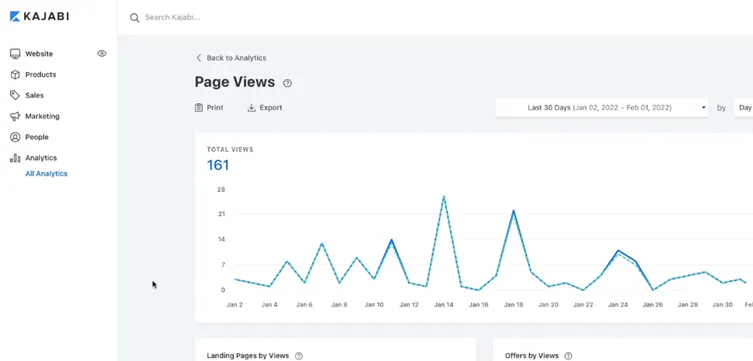
Kajabi’s analytics go beyond just tracking student behavior. It helps you get a complete overview of how your entire business is performing, which is essential for long-term growth. You can see how each course is doing, identify trends, and make data-driven decisions to improve both your content and marketing efforts.
Passion.io’s Performance Tracking
Passion.io focuses more on tracking individual student performance, which makes it particularly useful for creators who need to closely monitor how their users are interacting with their courses. With Passion.io, you can track key metrics like:
- Completed lessons, helping you see how far students have progressed.
- Time spent on the app, giving insights into user engagement.
- Completion streaks, which can reveal how consistently students are participating.
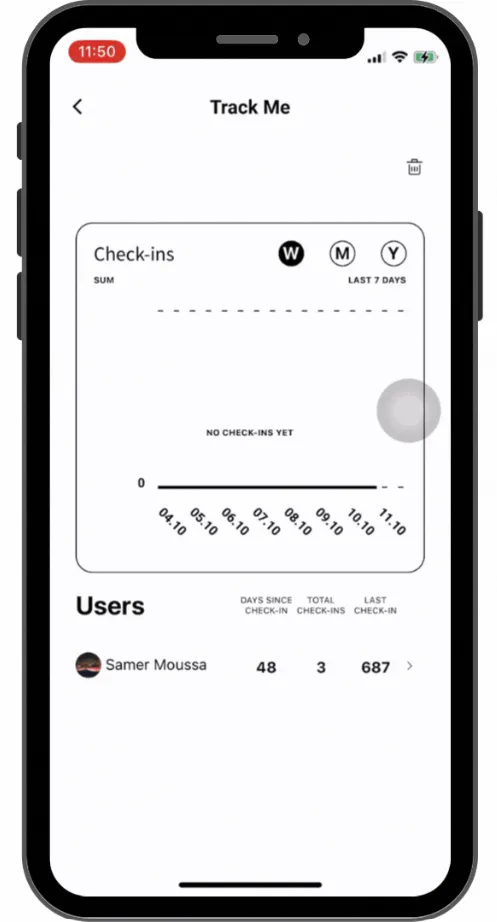
In addition to tracking student progress, Passion.io also gives you a general overview of your estimated app earnings, letting you know how well your app is performing financially. The platform offers both private and public tracking options, allowing you to either monitor student progress behind the scenes or share it openly within your community to encourage engagement.
Winner: Kajabi
While both platforms offer valuable insights, Kajabi takes the lead with its comprehensive dashboard. Kajabi not only tracks student progress but also provides a full picture of your business’s overall health, including metrics like net revenue and page views. This broader approach allows you to analyze how your courses are performing and make strategic decisions to improve your business. Passion.io’s strength lies in its detailed focus on individual student tracking, which is great for creators who need close monitoring of student performance, but Kajabi’s all-encompassing analytics make it the winner in this category.
Understanding your business metrics is vital for growth. For a deeper dive into how Kajabi can help you track and analyze your performance, check out our detailed guide on Kajabi Analytics & Reporting.
Kajabi vs Passion.io: Student Engagement
When it comes to engaging students, Kajabi and Passion.io offer different features. Kajabi focuses on creating a dynamic community with live events, challenges, and rewards, while Passion.io offers more basic features like direct messaging and goal tracking.
Kajabi’s Student Engagement Features
Kajabi makes it easy to build a lively and interactive community. You can host live sessions, create challenges, and reward your students for their participation. Kajabi’s Communities feature lets you set up live rooms, events, and meetups—both virtual and in-person. These events not only help students connect but can also attract new customers by fostering a strong, active community.
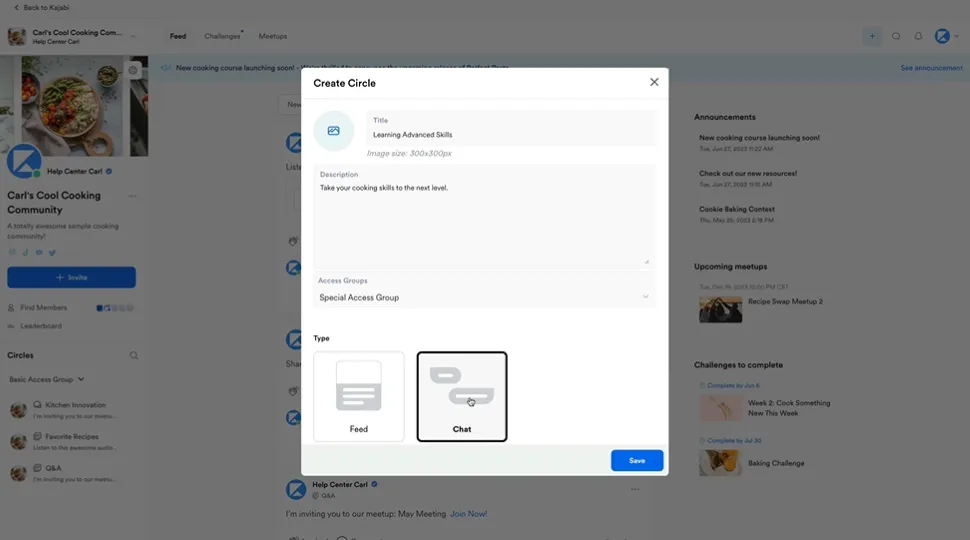
Another great feature is Kajabi Circle, where students can interact with each other before, during, or after your events. This keeps the conversation going and helps build relationships among members.
To keep things fun and engaging, Kajabi also offers gamification. You can use a points system to reward the most active members. These points can be displayed on leaderboards, and you can even give rewards like access to exclusive content to motivate participants to stay engaged and active in your community.
Passion.io’s Student Engagement Features
Passion.io offers a variety of tools to keep students engaged, though they focus more on individual interaction. Coaches using Passion.io can take advantage of quizzes, worksheets, calculators, and live lessons to engage their students. One standout feature is goal tracking, which allows coaches to set up challenges and monitor student progress remotely. You can even send reminders to keep students on track and motivated.
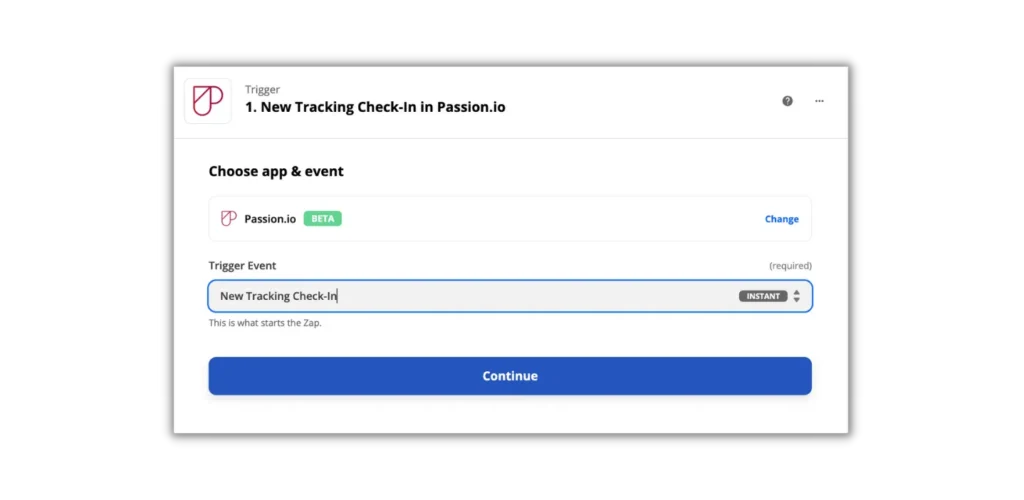
Another useful feature in Passion.io is the ability to create channels. These channels let students message each other directly, as well as communicate with their coach. Coaches can also manage their clients’ schedules and reply to comments directly through the mobile app, making it a convenient tool for both instructors and students.
Winner: Kajabi
While both platforms offer strong engagement features, Kajabi takes the win with its more comprehensive options. Kajabi allows you to host live events, create virtual and in-person meetups, and engage your students through challenges, points, and leaderboards. These features help to build a vibrant community and increase customer retention. Passion.io offers valuable interactive tools like goal tracking and direct messaging, which personalize the student experience, but Kajabi’s broader community-building features make it a more robust choice for boosting engagement and driving sales.
Kajabi vs Passion.io: Pricing
When comparing pricing between Kajabi and Passion.io, it’s important to note that Kajabi doesn’t charge transaction fees, while Passion.io does.
Kajabi Pricing
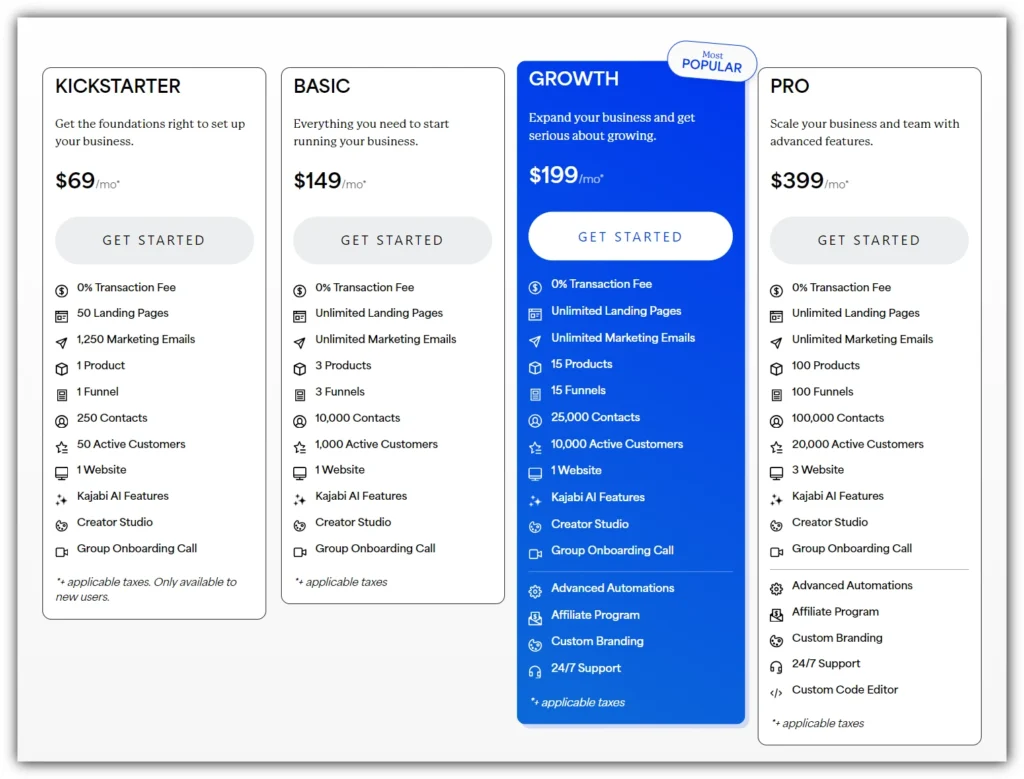
Kajabi’s pricing is a bit higher, but the good news is that there are no transaction fees on any plan. Here’s a breakdown of the different options:
- The Kickstart plan starts at $69 per month and lets you create one digital product and sell it to up to 50 active customers. It’s a great option for beginners.
- The Basic plan costs $149 per month. It includes three products and supports up to 1,000 active members. This is ideal for entrepreneurs who want to try out the platform before committing to a bigger plan.
- The most popular plan, the Growth plan, is priced at $199 per month. This plan allows you to create up to 15 products and serve 10,000 active members, making it perfect for expanding businesses.
- The highest-tier Pro plan is $399 per month. It supports up to 100 products and 20,000 active members. If you choose an annual subscription, you get a 20% discount on any plan.
Passion.io Pricing
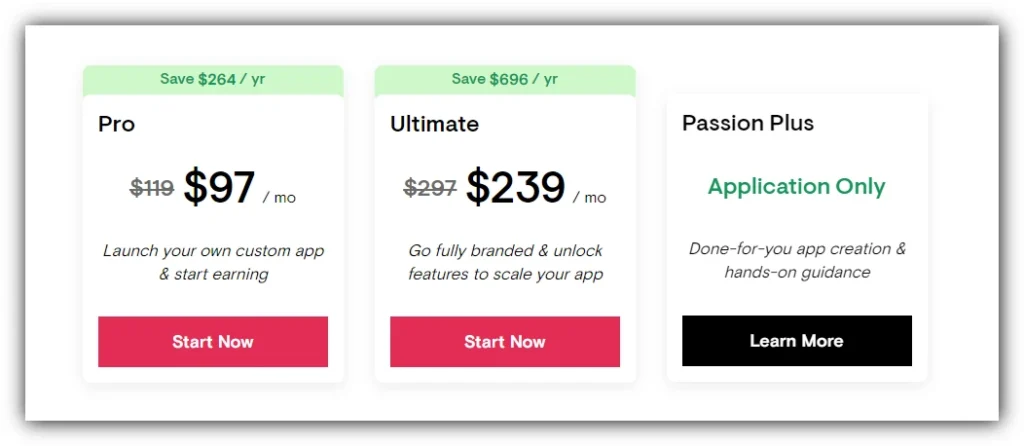
Passion.io’s pricing starts lower, but they do charge a 3.9% transaction fee if you’re using their Passion Payments feature. Here’s how the pricing looks:
- The starting plan is $97 per month (when billed annually). However, this plan limits you to 100 subscribers, 100 videos, and 1,000 push notifications.
- Passion.io’s higher-tier plans offer unlimited courses, but the 3.9% transaction fee applies if you’re using their payment system.
For those looking for more help, there’s also the Passion Plus plan, which is a “Done for You” service where the Passion.io team helps you build your app in 30 days or less, along with marketing and sales support. To qualify for this plan, you’ll need:
- A solid app idea,
- An existing, profitable business ready to grow,
- The time and budget to invest in developing your app.
Winner: Kajabi
Kajabi wins here because it has no transaction fees and offers more users in its entry-level plan compared to Passion.io. Kajabi also gives you a 14-day trial to test the platform. However, if you sign up through my affiliate link, you can get a full 30 days for free to try it out!
Kajabi vs Passion.io: Pros & Cons
Here’s a quick breakdown of the advantages and disadvantages of Kajabi. This will help you decide if it’s the right platform for your needs.
Kajabi Pros
- No hidden fees: Kajabi doesn’t charge any extra fees like transaction fees, so you get to keep more of your earnings.
- Advanced built-in tools: Kajabi comes with a variety of powerful tools for creating courses, marketing, and managing your business—all in one platform.
- AI-powered content creation: Kajabi’s AI tools can help you quickly create course content, sales copy, and even social media posts, saving you time and effort.
- Global brand settings: Kajabi lets you set global branding options like your logo and colors. This ensures that all your pages and products are consistent with your brand.
- In-depth course analytics: Kajabi provides detailed analytics to help you track student progress, revenue, and other key metrics to grow your business.
Kajabi Cons
- No branded mobile app: Unlike some other platforms, Kajabi doesn’t offer the option to create a fully branded mobile app for your courses.
- Higher pricing: Kajabi’s pricing plans can be expensive, especially if you’re just starting out or working with a limited budget.
- Limited products on the starter plan: The basic plan only allows you to offer a limited number of products, which may be restrictive for some creators.
- Fewer integrations: While Kajabi has many built-in tools, it doesn’t have as many third-party integrations as some other platforms, which may limit your flexibility.
Passion.io Pros
- Toggle Passion.io branding on or off: You have the flexibility to remove Passion.io’s branding and make the app look more like your own, giving it a more personalized feel.
- Create courses directly on the mobile app: Passion.io allows you to create and manage your courses entirely through their mobile app, which is convenient for creators who are always on the go.
- Zapier integrations: Passion.io connects with Zapier, making it easier to integrate with other tools and platforms to automate workflows and extend functionality.
- Customizable ‘done-for-you’ plan: With Passion.io’s higher-tier “Done-for-you” plan, their team helps you build a fully customized app, saving you time and effort while offering marketing and sales support.
Passion.io Cons
- Pricing limitations on landing pages: Passion.io’s in-app landing pages come with price caps for one-time purchases and subscriptions due to Apple’s guidelines, which might restrict your pricing strategy.
- Transaction fees: Passion.io charges transaction fees (3.9%) if you use their Passion Payments feature, which can eat into your profits.
- Limited business data analytics: Unlike some platforms, Passion.io doesn’t provide detailed insights into overall business performance, which could limit your ability to track growth.
- Starter plan has limited subscribers: The basic plan has restrictions on the number of subscribers you can have, which might be limiting if you’re looking to grow quickly.
These advantages and disadvantages of Kajabi and Passion.io will help you decide which platform to use for your online courses.
Which Platform Should You Choose?
Kajabi is ideal for entrepreneurs and creators who need an all-in-one platform to create, market, and sell their digital products. It’s a comprehensive solution that also helps you grow your business over time. On the other hand, Passion.io is perfect for creators and coaches who want to develop branded mobile apps, especially for selling fitness or coaching programs.
| Kajabi | Passion.io |
| Best for: Business owners who want a single platform to create courses and market them effectively for business growth. | Best for: Fitness trainers and content creators seeking a mobile app to connect with and earn money from their clients from a distance. |
By now, you’ve likely realized that Kajabi and Passion.io cater to different business models, making them not direct competitors but rather tools for distinct needs.
Kajabi stands out as a complete platform for building and marketing digital products. It includes powerful student engagement tools, such as community-building features. However, it is mainly web-based and doesn’t offer a fully branded mobile app experience.
Passion.io, on the other hand, focuses on a mobile-first experience. It allows you to create courses directly on a mobile app and offers the ability to build a custom-branded app for students to download and access courses. However, it lacks advanced marketing tools and relies heavily on third-party integrations like Zapier to fill that gap.
To help you choose the right platform, here’s our recommendation based on specific needs:
Choose Kajabi if:
- You’re an entrepreneur or creator looking to build and sell online courses or digital products.
- You want to automate your marketing and simplify your processes.
- You’re looking for detailed analytics to track and manage your entire business.
Click here to get started with Kajabi!
Choose Passion.io if:
- You want to primarily engage with students on mobile devices.
- You’re a coach who needs to track student progress and performance.
- You prefer creating courses on the go using your mobile phone.
By selecting the platform that best fits your business model, you can optimize both your course creation and how you engage with your students or clients.
If you’re still weighing your options and considering other platforms, you might find it helpful to read our comparison of Kajabi vs ConvertKit to make an informed decision.
Conclusion
Choosing the right platform to host and grow your online courses can be a game-changer for your business. Both Kajabi and Passion.io offer valuable solutions but cater to different needs.
Kajabi is ideal if you’re looking for an all-in-one platform that simplifies course creation, marketing, and sales, while also offering powerful community engagement and detailed analytics. It’s perfect for entrepreneurs who want to run their entire digital business in one place without needing multiple tools.
Passion.io, on the other hand, is best suited for creators who want to offer a more personalized mobile experience. If your business revolves around coaching or fitness, and you prefer interacting with your audience primarily through a branded app, Passion.io is a great option.
Ultimately, the platform you choose should align with your business model and how you plan to engage with your audience. Kajabi gives you a broad toolset to manage your entire business, while Passion.io allows you to stand out with a custom-branded app for mobile-focused engagement.
Take the time to evaluate your priorities, and you’ll find the platform that best supports your course creation journey.